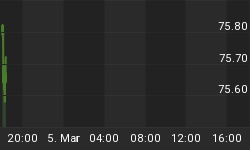Editor's Note: This article has been excerpted from a free issue of Robert Prechter's monthly market letter, The Elliott Wave Theorist.
The full 10-page market letter, Be One of the Few The Government Hasn't Fooled, can be downloaded free from Elliott Wave International.
"Who Will Benefit From The Housing Act?"
This question is an actual headline from a national daily paper. The real answer is: mortgage lending corporations, developers, real estate agents, speculators and politicians. The government is also pledging tax money to providers of "financial counseling" and grants for speculators who want to "buy and renovate foreclosed housing"; in other words, it will hand tax money to charlatans and unfunded wheeler-dealers. But a far better headline would have been, "Whom Will the Housing Act Hurt?" The answer to that question is: (1) prudent people, i.e. savers, earners, renters and people who have waited to buy a house at a reasonable price; and (2) innocent people, i.e. taxpayers.
Government action (unless it is aimed at destruction) always causes the opposite of its stated effect. If taxpayers ultimately have to shoulder the burden for all the bad mortgage debt, those who are on the edge of being able to make their mortgage payments will be forced over the edge, causing more missed mortgage payments and more foreclosures.
There is never any need for a law granting privilege except when the goal is to reward the undeserving and to punish the innocent. If the goal were otherwise, there would be no need for a statutory law, because the natural laws of economics, when unencumbered, serve to reward the deserving and punish the imprudent and the guilty. Populists loudly challenge this idea, but they are wrong.
I thought the Fed was created to "help manage the economy."
After a secret meeting on Jekyll Island (GA), Congress and a handful of bankers created the Federal Reserve System for two purposes. The first one was to allow the government to counterfeit money, thereby letting it steal value from savers through inflation. The second was to allow bankers to make profits through debt creation, also at the expense of savers. Any other claim is a smokescreen.
So shouldn't we blame the Fed for the country's financial problems?
That's like blaming the collapse of your house on the biggest termite. The Fed is only one of the monsters that Congress has created. In the financial realm, others include Fannie Mae, Freddie Mac, Ginnie Mae, Sallie Mae, the FDIC, the FHA, the FHLBs and the income tax. But there are also a hundred other havoc-wreaking agencies of the federal government. Congress is to blame for ruining America. The Fed is only one of the mechanisms it created along the way. It's a big one, and it's fine to campaign against it, but to blame it for everything is to give its creator a free pass.
This is an important distinction, because many people seem to think that abolishing the Fed will cure America's money woes. They seem to think that once the Fed is abolished, Congress will behave responsibly. One website even calls for abolishing the Fed in favor of giving money-printing power directly to the federal government! Abolishing the Fed is a worthy goal, but Congress will work tirelessly to create one disastrous institution after another, because that's what campaign donors pay for.
For more information on the government's role in the financial crisis, download Robert Prechter's free 10-page market letter, Be One of the Few the Government Hasn't Fooled.















